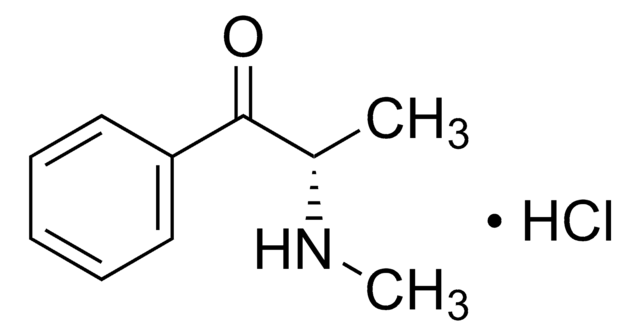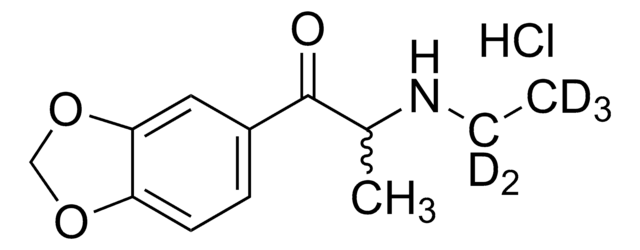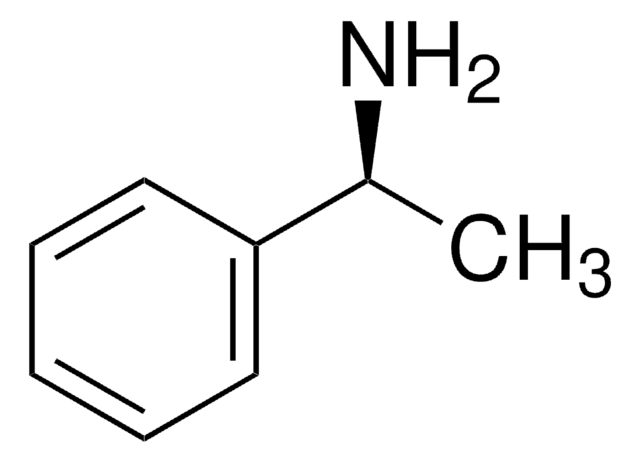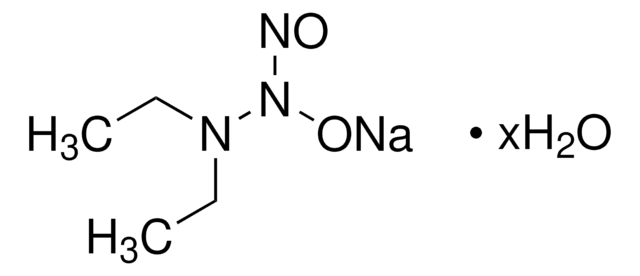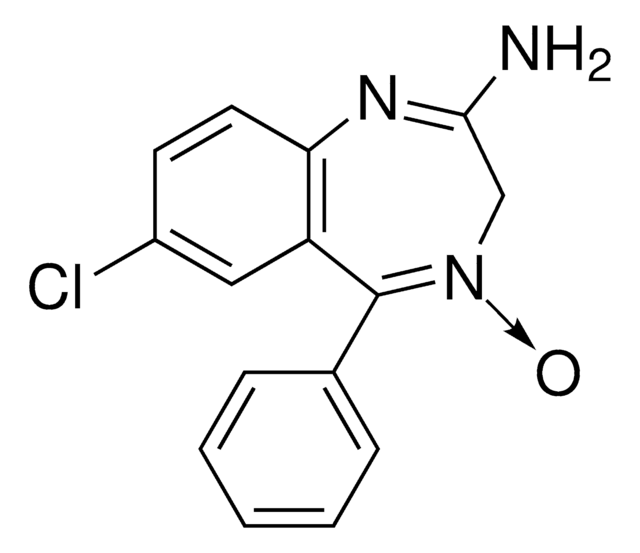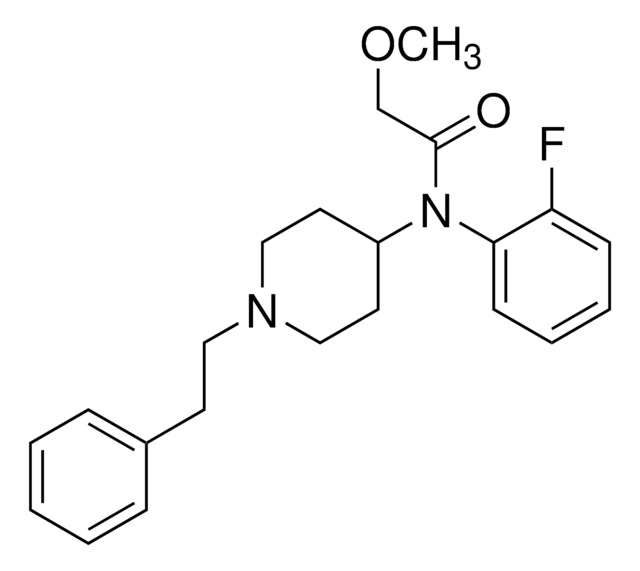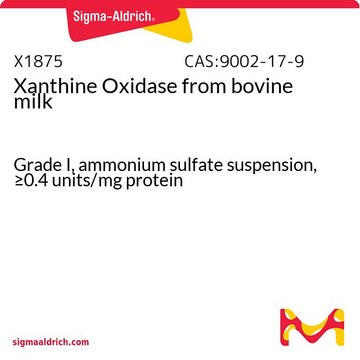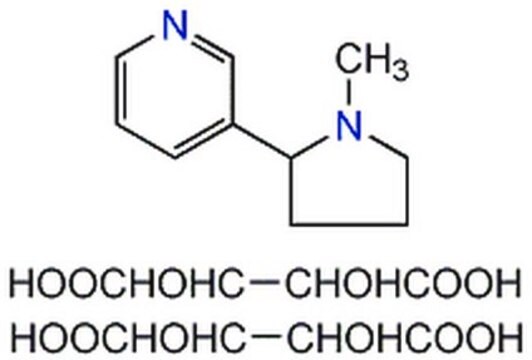E-071
Ethylone hydrochloride
1.0 mg/mL in methanol (as free base), ampule of 1 mL, certified reference material, Cerilliant®
Synonym(s):
Ethylone hydrochloride solution
About This Item
Recommended Products
grade
certified reference material
Quality Level
form
liquid
feature
Snap-N-Spike®/Snap-N-Shoot®
packaging
ampule of 1 mL
manufacturer/tradename
Cerilliant®
drug control
Narcotic Licence Schedule E (Switzerland); psicótropo (Spain); Decreto Lei 15/93: Tabela IIA (Portugal)
concentration
1.0 mg/mL in methanol (as free base)
technique(s)
gas chromatography (GC): suitable
liquid chromatography (LC): suitable
application(s)
forensics and toxicology
format
single component solution
storage temp.
−20°C
InChI
1S/C12H15NO3.ClH/c1-3-13-8(2)12(14)9-4-5-10-11(6-9)16-7-15-10;/h4-6,8,13H,3,7H2,1-2H3;1H
InChI key
FQUJUYOEUQPDDR-UHFFFAOYSA-N
General description
Application
- Synthesis and Characterization of Ethylone Hydrochloride: Research has identified polymorphism in ethylone hydrochloride, contributing valuable knowledge for the synthesis and characterization of this psychoactive compound, applicable in forensic science and designer drug analysis (Maheux et al., 2016).
- Crystallographic Studies of Ethylone Hydrochloride: Inversion twinning in a second polymorph of ethylone hydrochloride has been documented, providing insights into its crystal structure, which is crucial for understanding the physical properties and stability of this substance (Cameron et al., 2015).
Legal Information
Application
related product
Signal Word
Danger
Hazard Statements
Precautionary Statements
Hazard Classifications
Acute Tox. 3 Dermal - Acute Tox. 3 Inhalation - Acute Tox. 3 Oral - Flam. Liq. 2 - STOT SE 1
Target Organs
Eyes
Storage Class Code
3 - Flammable liquids
WGK
WGK 1
Flash Point(F)
49.5 °F - closed cup
Flash Point(C)
9.7 °C - closed cup
Choose from one of the most recent versions:
Certificates of Analysis (COA)
Sorry, we don't have COAs for this product available online at this time.
If you need assistance, please contact Customer Support.
Already Own This Product?
Find documentation for the products that you have recently purchased in the Document Library.
Articles
As new “bath salt” drugs such as methylone, ethylone, mephedrone, butylone and other methcathinone analogs increase in popularity, toxicologists require native and labeled certified reference materials to accurately identify and quantify the new compounds in patient samples.
The combination of ion-exchange SPE with the HILIC HPLC separation provides a novel approach for the testing of problematic bath salt compounds.
LC-MS/MS is a powerful tool that brings numerous benefits to the clinical sample analysis arena. However, due to the complexity of the instrumentation there are some unique challenges that also accompany these benefits. Even following sample extraction and cleanup, matrix effects from the samples can cause interferences or impact ionization efficiency.
Protocols
Separation of 3,4-Methylenedioxypyrovalerone HCl (MDPV) solution, 1.0 mg/mL in methanol (as free base), ampule of 1 mL, certified reference material; Buphedrone hydrochloride solution, 1.0 mg/mL in methanol (as free base), ampule of 1 mL, certified reference material; 3-Fluoromethcathinone hydrochloride solution, 1.0 mg/mL in methanol (as free base), ampule of 1 mL, certified reference material; Butylone hydrochloride solution, 1.0 mg/mL in methanol (as free base), ampule of 1 mL, certified reference material; Ethylone hydrochloride, 1.0 mg/mL in methanol (as free base), ampule of 1 mL, certified reference material; 4-Fluoromethcathinone hydrochloride solution, 1.0 mg/mL in methanol (as free base), ampule of 1 mL, certified reference material; Mephedrone hydrochloride solution, 1.0 mg/mL in methanol (as free base), ampule of 1 mL, certified reference material; Methylone hydrochloride, 1.0 mg/mL in methanol (as free base), ampule of 1 mL, certified reference material; Methedrone hydrochloride solution, 1.0 mg/mL in methanol (as free base), ampule of 1 mL, certified reference material
Chromatograms
application for HPLCOur team of scientists has experience in all areas of research including Life Science, Material Science, Chemical Synthesis, Chromatography, Analytical and many others.
Contact Technical Service